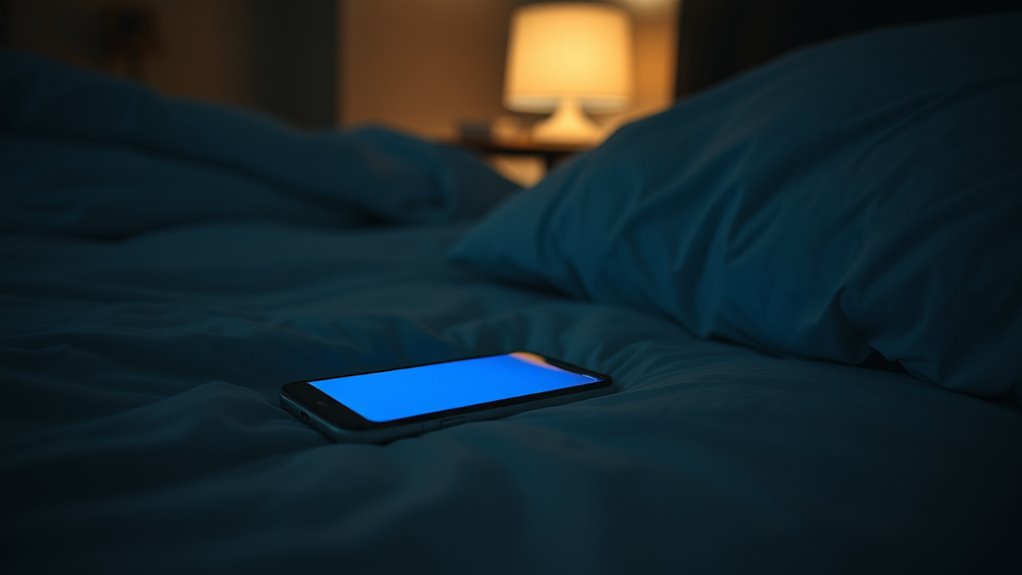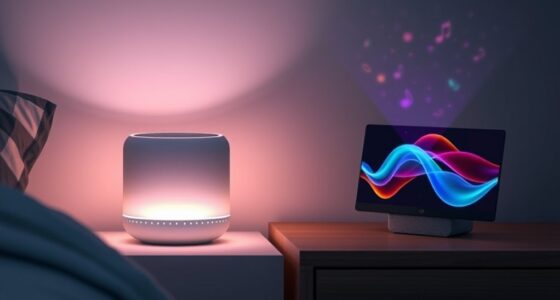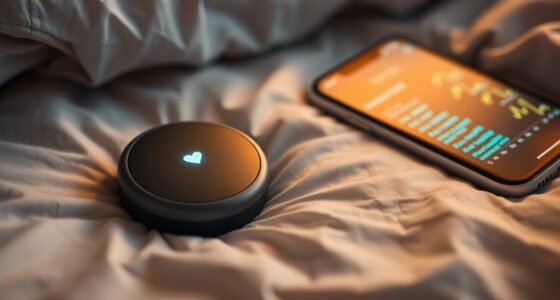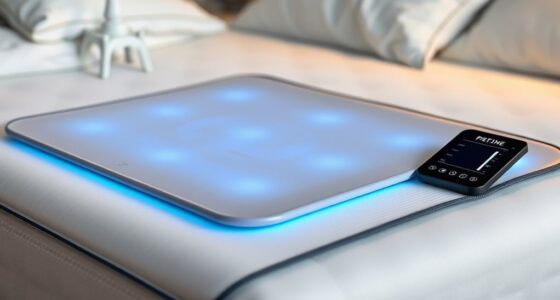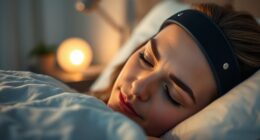Sleep apps can help you fall asleep faster by using relaxation techniques, soothing sounds, and tracking features that promote rest. They guide you through calming meditations, control breathing, and create ideal sleep environments, which may reduce stress and racing thoughts. While some benefits come from the placebo effect or improved routines, their effectiveness varies. Keep exploring to understand how to make the most of these tools and improve your sleep quality.
Key Takeaways
- Sleep apps can promote relaxation through sounds and guided meditations, potentially reducing pre-sleep anxiety and helping users fall asleep faster.
- Features like breathing exercises and personalized routines may facilitate quicker sleep onset by calming the nervous system.
- Although sleep apps improve relaxation, evidence on significantly shortening sleep onset time is limited and varies by individual.
- Consistent use of sleep apps combined with good sleep hygiene can enhance the likelihood of faster sleep initiation.
- The placebo effect and user expectation can contribute to perceived improvements in sleep onset, regardless of actual physiological changes.
How Do Sleep Apps Claim to Improve Rest?
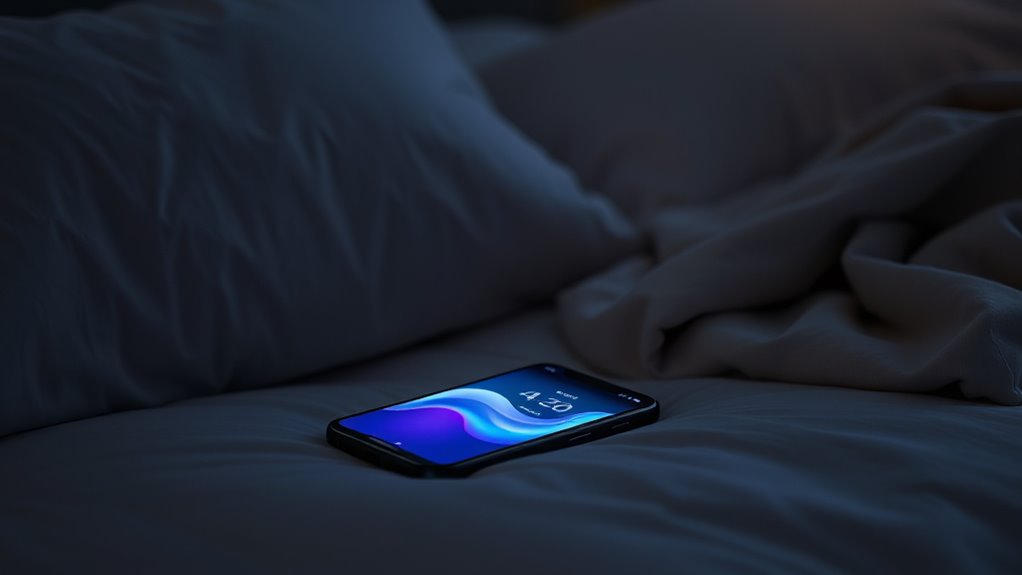
Sleep apps claim to improve your rest by tracking your sleep patterns and providing personalized insights. They analyze your sleep cycle, helping you understand when you’re in light, deep, or REM sleep. Some apps include dream analysis features, encouraging you to log dreams to discover patterns or emotional links. By understanding your sleep cycle, the app can suggest *best* times to wake you up during light sleep, reducing grogginess. They also offer relaxation techniques and bedtime routines tailored to your habits. The idea is that these insights and tools help you develop healthier sleep habits, ultimately making it easier to fall asleep faster and achieve more restorative sleep. While the effectiveness varies, these features aim to *maximize* your sleep quality through detailed tracking and personalized feedback. Additionally, some apps incorporate eco-friendly design principles, such as reducing screen time or promoting natural relaxation methods, to support healthier sleep environments.
The Science Behind Relaxation and Sleep Induction
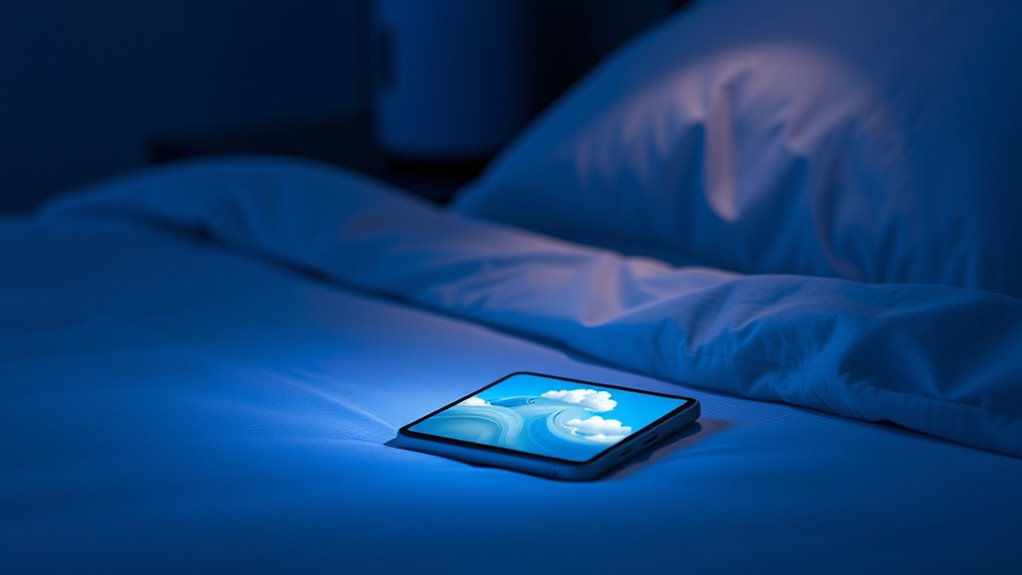
Your brain responds to relaxing sounds and rhythms by syncing its waves, which can help you feel calmer and ready for sleep. Breathing exercises and slow heart rates also signal your body to unwind and shift into rest. Understanding these processes shows how sleep apps aim to harness natural relaxation mechanisms to help you fall asleep faster. Additionally, the use of headphones can enhance the effectiveness of these sounds by providing immersive audio experiences that block out external disturbances.
Brainwave Entrainment Effects
Brainwave entrainment works by using rhythmic stimuli—such as sounds or lights—to synchronize your brain’s electrical activity with specific frequencies associated with relaxation and sleep. This process promotes neural synchronization, aligning your brainwaves with targeted states. Through frequency modulation, these stimuli gently influence your brain to produce slower waves, like delta and theta, which are linked to deep sleep and relaxation. When your brain responds to these rhythmic cues, it’s more likely to enter a restful state faster. This technique leverages your brain’s natural ability to adapt to external rhythms, making it easier to shift into sleep. While evidence varies, many find that brainwave entrainment helps reduce sleep latency by actively guiding your brain toward sleep-ready wave patterns.
Breathing and Heart Rate
Because breathing and heart rate are closely linked to relaxation, controlling them can substantially influence your ability to fall asleep faster. When your heart rate slows and breathing becomes steady, your body enters a relaxed state ideal for sleep. Techniques such as deep breathing or diaphragmatic breathing can help achieve this. Additionally, improving your sleep environment by minimizing noise and light supports heart rate regulation. Dream journaling before bed clears your mind of worries, reducing stress that may elevate your heart rate. To optimize relaxation, consider:
- Practicing slow, deep breaths for 5-10 minutes
- Using guided breathing exercises via sleep apps
- Maintaining a cool, dark sleep environment
- Incorporating calming routines like meditation or gentle stretching before bed. These strategies can promote relaxation and help you fall asleep faster.
Are Guided Meditations and Sounds Effective?
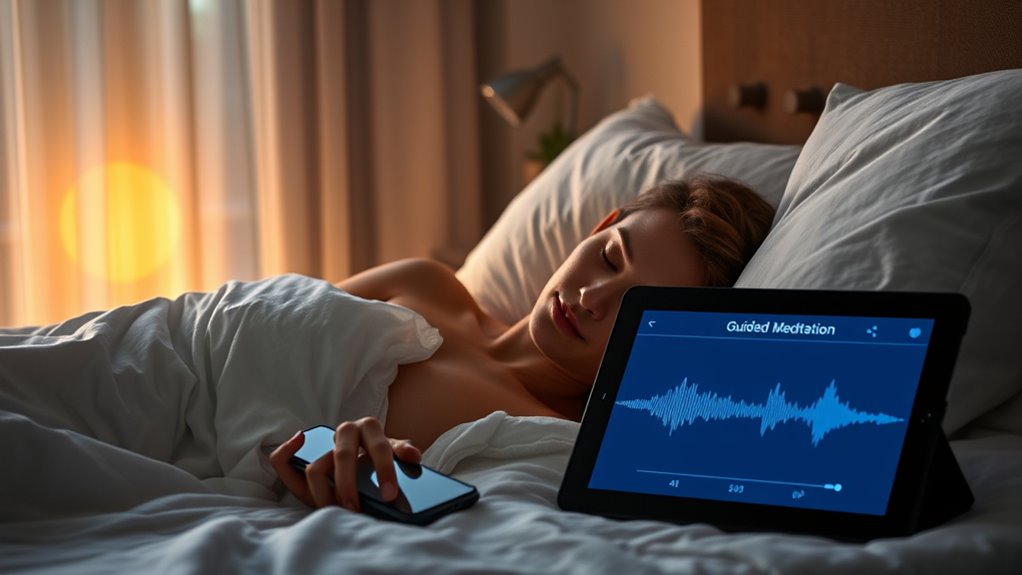
Are guided meditations and calming sounds truly effective in helping you fall asleep faster? Many sleep apps incorporate meditation techniques and sound therapy to create a relaxing environment. These methods aim to quiet your mind and reduce stress, making it easier to drift off. Guided meditations often focus on breathing, visualization, or body scans, which can help you let go of racing thoughts. Similarly, soothing sounds like white noise, nature sounds, or gentle music can mask disruptive noises and promote a calming atmosphere. While some find these tools incredibly helpful, their effectiveness varies from person to person. Overall, when used consistently, guided meditations and sounds can serve as powerful sleep aids, especially if they help you establish a relaxing pre-sleep routine. Incorporating mindfulness practices can further enhance their benefits by fostering a deeper sense of calm and presence before sleep.
Examining the Evidence: Do Sleep Apps Make a Difference?
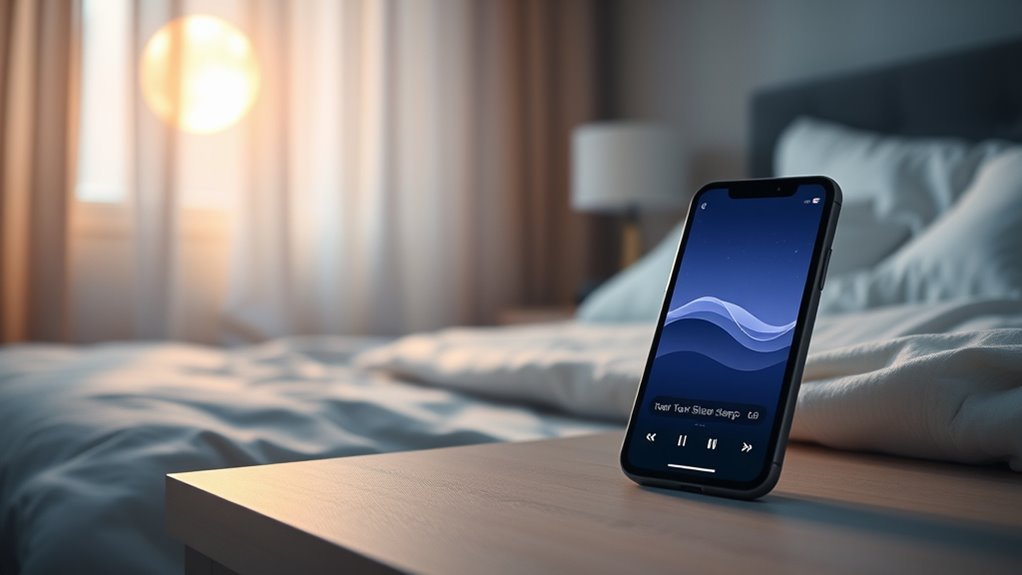
While guided meditations and calming sounds can be beneficial, it’s important to look at the scientific evidence to see if sleep apps truly make a difference. Research shows mixed results regarding their impact on your sleep cycle and overall sleep quality. Some studies suggest that:
- Sleep apps may help improve sleep onset time but often don’t alter deep sleep stages.
- They can track sleep patterns, offering insights into your sleep cycle, but often lack precision.
- Dream analysis features are largely anecdotal, with little scientific backing on improving sleep quality.
- The effectiveness depends heavily on user engagement and consistency, rather than the app itself.
- The integration of AI in sleep apps, including data-driven insights, can enhance their potential benefits but also raises questions about AI security and data privacy.
The Placebo Effect and Expectation in Sleep Improvement
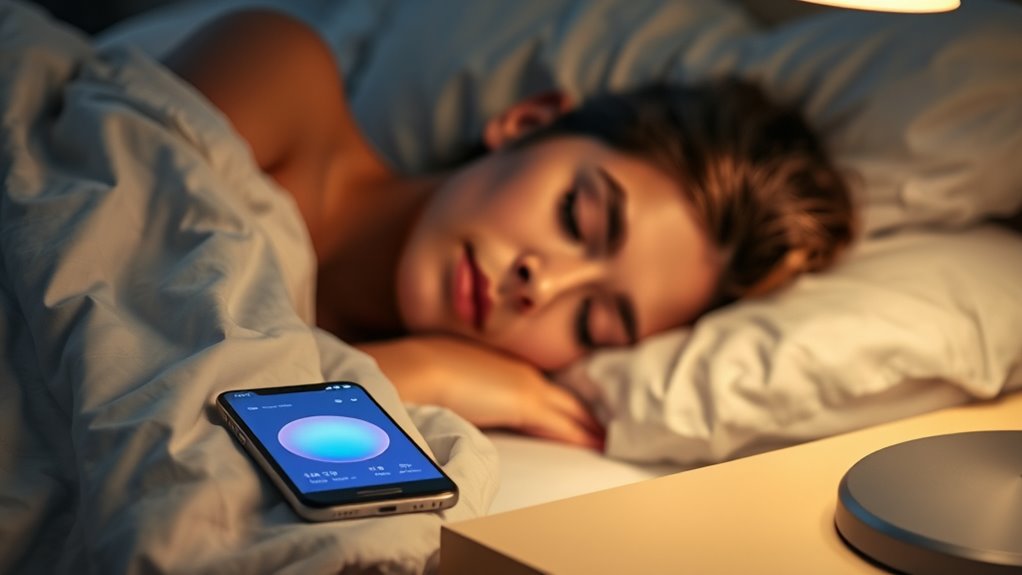
The power of expectation plays a significant role in how effectively sleep apps can help you fall asleep. Your belief in their effectiveness can trigger a placebo effect, making you feel more relaxed and ready for rest. This expectation influence can sometimes be stronger than the app’s actual features. Visualize your mind and body as:
| Expectation | Reality |
|---|---|
| Belief it works | Actual sleep quality |
| Confidence boosts | Sleep improvement |
When you expect an app to help, your brain may release calming signals, easing your transition to sleep. This psychological effect demonstrates that your mindset can be just as important as the technology itself in falling asleep faster. Additionally, practicing stillness can enhance your ability to relax and support sleep, highlighting the importance of mental calmness in sleep quality.
Potential Downsides of Relying on Sleep Technology
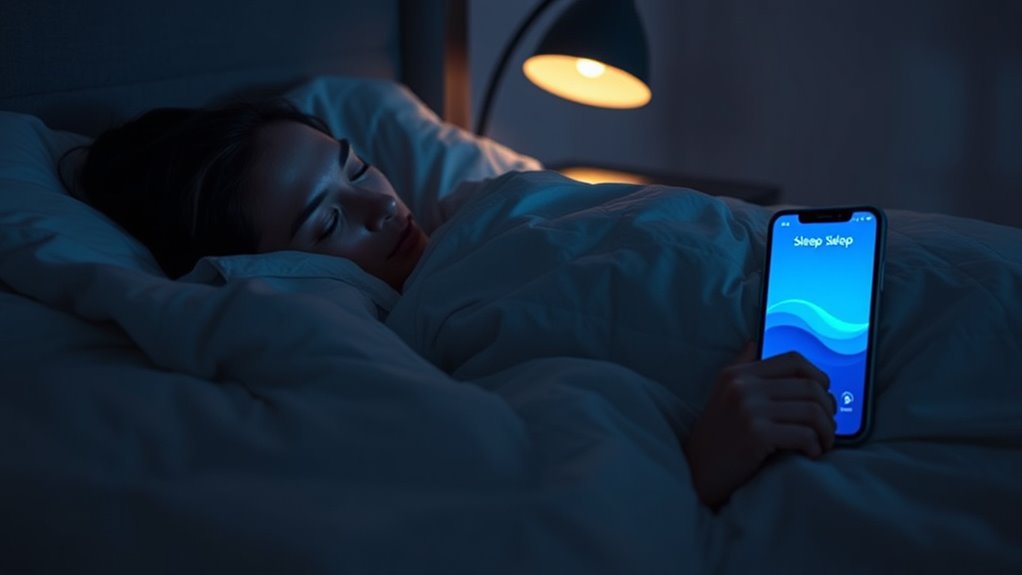
Relying heavily on sleep technology can sometimes backfire, leading to unintended negative effects. First, you might develop device dependency, making it harder to fall asleep without your app or tracker. Second, privacy concerns arise, as your sleep data could be shared or hacked without your consent. Third, over-monitoring may cause anxiety, making you more aware of sleep issues instead of relaxing. Fourth, inaccurate data can give you false alarms or mislead you into unnecessary worry. These issues can undermine your sleep quality rather than improve it. Additionally, overreliance on technology may reduce your natural ability to recognize and respond to your body’s sleep cues. While sleep tech offers benefits, it’s essential to stay aware of these potential downsides to avoid becoming overly dependent or compromising your privacy. Balance and moderation are key.
Tips for Complementing Sleep Apps With Good Sleep Habits
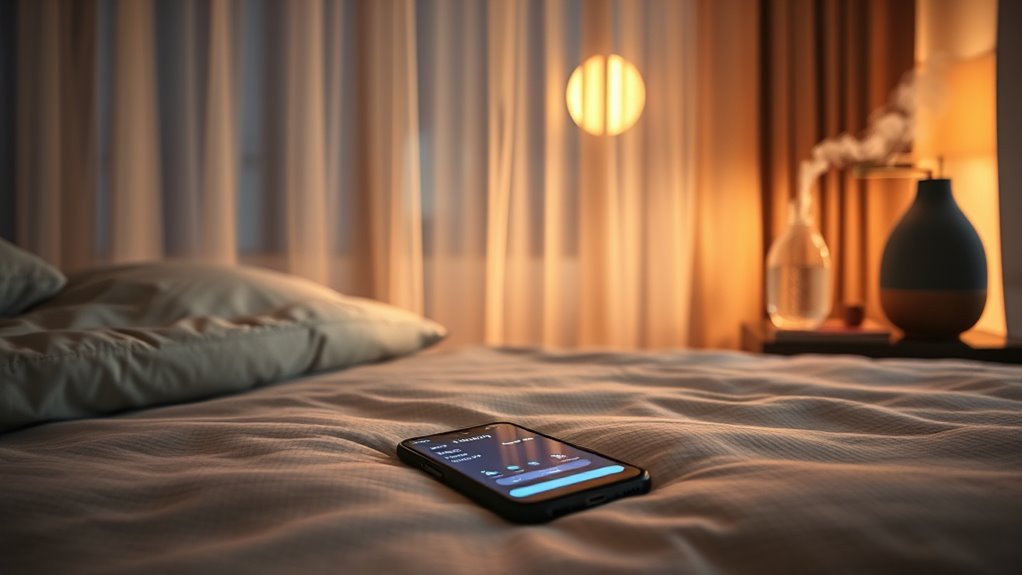
To get the most benefit from sleep apps, it’s important to pair their use with proven sleep habits. Good sleep hygiene is essential, so establish consistent bedtime routines that signal to your body it’s time to wind down. Avoid screens, caffeine, and heavy meals before bed, as these can interfere with sleep. Create a relaxing environment by dimming lights and keeping your bedroom cool and quiet. Incorporate calming activities like reading or gentle stretches to help your mind and body relax. Using sleep apps alongside these habits can reinforce your sleep routine, making it easier to fall asleep faster. Signs of spoilage in your sleep environment, such as noise or light, can also disrupt your rest. Consistency is key—by sticking to healthy habits, you’ll enhance the effectiveness of sleep apps and improve your overall sleep quality.
Making an Informed Choice: Are Sleep Apps Worth Using?
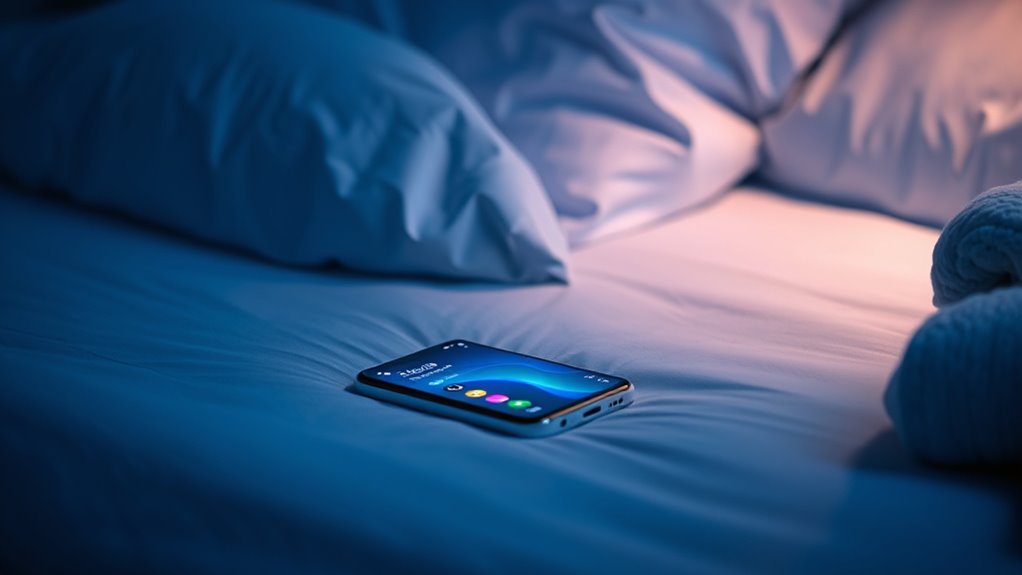
Before deciding if sleep apps are right for you, consider how effective they really are and what results you can expect. Think about whether the cost fits your budget and if the app is easy to access whenever you need it. Making an informed choice means weighing these factors carefully to see if sleep apps are truly worth trying. Additionally, understanding sleep hygiene can help you determine if app-based solutions address the root causes of sleep difficulties.
Subheading 1: Effectiveness and Outcomes
While sleep apps are designed to help you fall asleep faster, their effectiveness varies based on the features they offer and individual differences. Your sleep environment plays a role, as calming sounds or guided relaxation can improve sleep quality. User engagement is essential; apps that actively involve you through interactive features or personalized feedback tend to yield better outcomes. Consider these factors:
- Customizable soundscapes or guided meditations that promote relaxation.
- Sleep tracking data that helps identify patterns affecting your ability to fall asleep.
- Reminders or nudges encouraging consistent sleep routines.
- Interactive features that motivate you to stay committed and improve sleep habits.
Additionally, incorporating HEPA filtration or maintaining a clean sleep environment can indirectly support better sleep quality. Ultimately, effectiveness depends on how well you engage with the app and how it complements your sleep environment.
Subheading 2: Cost and Accessibility
Considering the varying features and potential benefits of sleep apps, it’s important to assess their affordability and how accessible they are. Many apps offer different pricing structures, so pricing transparency helps you understand what you’re paying for and avoid hidden costs. Some apps are free, while others require a subscription or one-time purchase. Device compatibility is also key—ensure the app works seamlessly with your smartphone or tablet. Compatibility issues can limit access or cause frustration, especially if you use a less common device or operating system. Before committing, compare options based on affordability, features, and device compatibility. This way, you can choose a sleep app that fits your budget and integrates smoothly into your routine, making it easier to decide if it’s worth trying. Additionally, understanding the influence of AI on app design can help you determine which apps incorporate helpful features like data analysis or personalized recommendations.
Frequently Asked Questions
Can Sleep Apps Replace Professional Sleep Therapy or Medical Advice?
Sleep apps can be useful for tracking sleep patterns and improving sleep hygiene, but they shouldn’t replace professional sleep therapy or medical advice. While they help you monitor your sleep quality and habits, persistent issues like insomnia or sleep apnea need expert diagnosis and treatment. Relying solely on sleep tracking apps might overlook underlying health concerns, so consult a healthcare professional for personalized guidance and effective solutions.
How Do Individual Differences Affect Sleep App Effectiveness?
Your individual differences markedly impact how effective sleep apps are for you. Personalization challenges mean these apps might not fully adapt to your unique sleep patterns or needs, affecting user engagement. If an app doesn’t feel tailored to your habits, you’re less likely to stick with it or see benefits. To improve results, choose apps that offer customizable features and actively engage you, helping you develop better sleep habits over time.
Are There Specific Sleep Apps Better Suited for Certain Sleep Issues?
Some sleep apps are better suited for certain sleep issues because they focus on different features. For example, if you struggle with sleep tracking, look for apps that monitor your sleep patterns closely. If relaxation techniques help you fall asleep, choose apps offering guided meditations or calming sounds. Find one tailored to your needs, and you’ll likely see better results in improving your sleep quality and falling asleep faster.
How Frequently Should I Use a Sleep App for Optimal Results?
Did you know that around 60% of users find daily sleep app usage beneficial? For ideal results, you should limit your usage frequency to once or twice a week, allowing your body to adapt without becoming dependent. The best duration depends on your needs, but using the app for about 20-30 minutes before bed can prepare your mind for sleep. Balance is key to achieving better sleep habits.
Do Sleep Apps Have Long-Term Benefits or Only Short-Term Relief?
Sleep apps can improve your sleep quality and help reduce stress over time, but their benefits aren’t just short-term. When used consistently, they teach you better sleep habits and track your progress, leading to lasting improvements. You might notice better sleep patterns and lower stress levels with continued use. However, for long-term benefits, combine app use with healthy lifestyle changes, ensuring sustained positive impacts on your sleep health.
Conclusion
Ultimately, whether a sleep app helps depends on your mindset and habits. For example, if you use a meditation app before bed and notice you fall asleep faster, you might see real benefits. But don’t rely solely on technology—combine it with good sleep routines like regular schedules and a calming environment. By staying informed and mindful, you can decide if sleep apps are a helpful tool on your journey to better rest.
